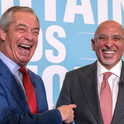The recent rounds of student protests have made for striking news coverage. Aerial photographs of throngs of youngsters hemmed in by police, smoke wafting over crowds, buildings with smashed glass—all are excellent grist for the mill of assumed student radicalism. And, whatever our personal views on the policies under protest, there is widespread feeling that students ought to protest; that marching and shouting is, at root, what students are for.
Yet students' political energy is definitively fickle. The columnist Johann Hari thinks that Nick Clegg could now be on course to losing his seat at the next election. This seems, at best, unlikely. Even if there were enough students in Clegg's Sheffield Hallam constituency to swing it one way or another (there aren't), there is no guarantee that enough of them would be registered, or bothered enough, to vote at all.
Part of the story of the Liberal Democrats' underwhelming performance at the last general election revolves around the electoral disengagement of students. Nick Clegg, the man who is now burnt in effigy by protesting youngsters, was polling massive approval from Britain's students following his debate performances. A substantial amount of his party's campaigning efforts were targeted at mobilising the student vote.
Yet student turnout did not spike in a meaningful way. According to Ipsos-Mori, only around 44% of 18-25 year-olds turned up at polling stations, an increase in line with the general 4% rise in voting numbers between 2005 and 2010. This is a familiar story.
Students are highly mobile—often living in a different home for each year of their studies, and so far less likely to be registered to vote in the right place at the right time. Fairly or unfairly, students have become associated with electoral apathy, a truism as powerful as that of student activism. Targeting the student vote has never, and will never, win any party a general election. The Liberal Democrats have long prided themselves on being thought of as student-friendly; however strange this seems now, it has hardly been a policy with a history of electoral benefits.
Students' tendency to self-disenfranchise may contribute to their willingness to express themselves in alternative ways. But to engage in the public sphere in a non-systemic way without participating in the institutionalised structures of democratic change seems terribly incoherent.
Many thinkers do espouse the importance of a developed public sphere, with vigorous protests and activist movements, over the clunking, regular influence of aggregative elections. The political theorist John Dryzek mentions, for example, the importance of the civil rights movement in forcing the introduction of liberal legislation in 1960s America.
Yet this cannot be a complete understanding of political change. It is difficult to imagine the successful passage of the landmark Civil Rights Act of 1964 under a potential early Nixon administration, rather than those led by Presidents Kennedy and Johnson. From this perspective, the most important single act in support of civil rights was not participation in marches or protests, but a vote cast in the 1960 presidential election: a triumph for aggregative, rather than activist, democratic process.
Students who really care about future tuition fees should be voters before they are protesters—if all of them had voted the way they said they would last time, maybe they'd have got their way on fees after all.
Shouldn't students put voting ahead of activism?
November 29, 2010












